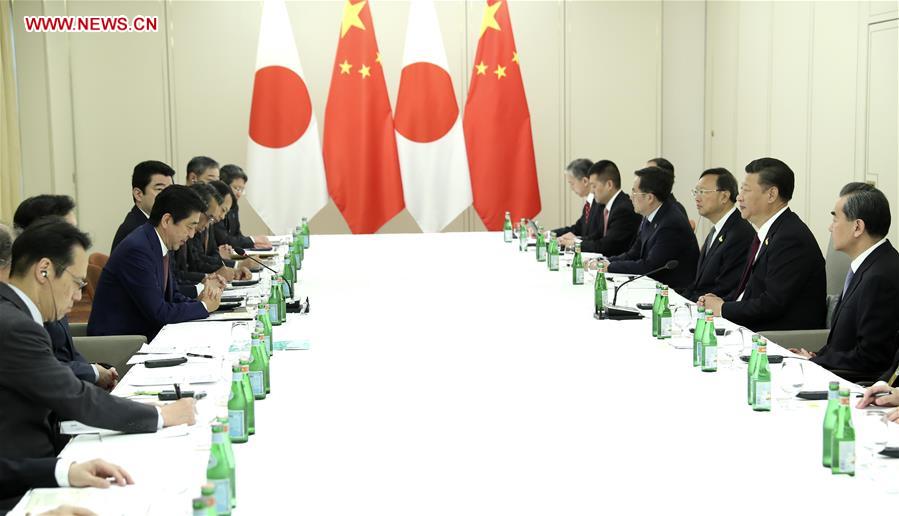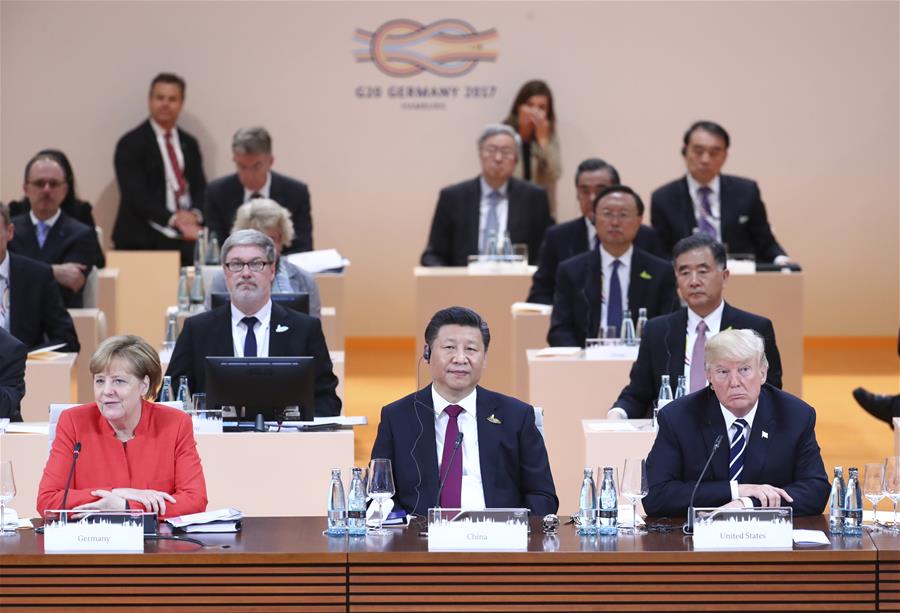Spotlight: Xi, Abe meet on ties, reaffirm readiness to strengthen China-Japan partnership

Chinese President Xi Jinping meets with Japanese Prime Minister Shinzo Abe in Hamburg, Germany, July 8, 2017. (Xinhua/Ma Zhancheng)
In a high-profile meeting here on Saturday, Chinese President Xi Jinping and Japanese Prime Minister Shinzo Abe reaffirmed their readiness to strengthen the partnership and cooperation between the two countries in the future despite differences in a trove of issues and severe challenges ahead.
The meeting was held on the sidelines of the ongoing Group of 20 (G20)summit in the German port city of Hamburg.
XI: JAPAN SHALL HONOR ITS WORDS ON HISTORY, TAIWAN
In the meeting, Xi said that Japan shall honor its words on issues related to history and Taiwan, and remove the distractions in bilateral relations with policies and concrete actions.
He also urged Japan to learn from history so as to ensure that bilateral relations run in the right direction and have a brighter prospect.
Xi noted that the sound neighborly relations between China and Japan concern not only the well-being of the two peoples, but also have an impact on Asia and the world at large. Xi noted that the sound neighborly relations between China and Japan concern not only the well-being of the two peoples, but also have an impact on Asia and the world at large.
China and Japan normalized their diplomatic relations 45 years ago after reaching key consensus on history, Taiwan and Diaoyu Islands, among other issues. Next year, the two nations will embrace the 40th anniversary of the signing of the China-Japan Treaty of Peace and Friendship.
The Chinese president said the two countries shall enhance their sense of responsibility at this moment, and seize the opportunities in the new era of bilateral ties.
In spite of twists and turns, and other severe tests in the past 45 years, the development of Beijing-Tokyo relations has rendered both sides many constructive inspirations, Xi said, calling for solid efforts to boost bilateral ties in accordance with the overall strategic direction of peace, amity and cooperation.
For Japan, it shall prove its willingness for better ties with China through concrete policies and actions, he added.
Political trust is the premise of the China-Japan relations, Xi said, referring to the four political documents and the four-point agreement that serve as the guiding principles of bilateral ties on properly handling issues related to history and Taiwan, among others.
These issues, vital to the political foundation of the China-Japan ties, bear no room for compromise or regress, or the bilateral relations will veer off the right course and slow down its pace of development, he said.
The Chinese president also welcomed Japan to join in the Belt and Road pragmatic cooperation, urging wide-range exchanges between the two sides on culture, education, media, local-level and youth in a bid to garner more public support for bilateral friendship.
ABE: JAPAN READY TO DISPLAY FORESIGHT IN BILATERAL RELATIONS
For his part, Abe said his country is ready to display foresight and add momentum to its ties with China, since the two countries, the world's second and third economies, respectively, are influential players on global and regional issues.
The Japanese leader eyed more high-level exchanges with China, adding that he is willing to enhance bilateral cooperation with China in such areas as economy and trade, finance, tourism, as well as the Belt and Road collaboration.
He also promised that regarding China's Taiwan, there is no change of Japan's stance inscribed in its joint statement with China in 1972.
Bilateral trust has been marred from time to time over Tokyo's reluctance on admitting its past war crimes, the attempt to annex China's Diaoyu Islands and adjacent islets in the East China Sea, and the initiative to abolish its post-war pacifist constitution that forbids the deployment of troops overseas for fight.
Tokyo was also a vigorous advocate of the so-called "China threat," frequently participating in military drills in Asia-Pacific with the United States, and selling weapons to the former Philippine administration when the Manila-manipulated South China Sea farce peaked to a failed arbitration last year.
SOURING RELATIONS BEHIND, SERIOUS ENGAGEMENT AHEAD
To patch up the bumpy relations and souring trust, China and Japan inked a four-point agreement in 2014, in which the two sides vowed to develop mutually beneficial relations, to face history squarely to overcome political obstacles in bilateral ties, to deter any escalation of confrontation via dialogue, consultation and crisis-management mechanism, and to resume political, diplomatic and security dialogues through bilateral and multilateral channels to enhance mutual trust.
These key principles came in the run-up to the high-profile Xi-Abe meeting in 2014 on the sidelines of the Asia-Pacific Economic Cooperation summit in Beijing. Since then, the once frozen exchanges between the two neighbors have showed some signs of thawing.
The Chinese president, while meeting in May with Toshihiro Nikai, secretary-general of Japan's ruling Liberal Democratic Party, who arrived in Beijing for the Belt and Road Forum for International Cooperation on behalf of the Japanese government, urged joint efforts of both sides to ensure that bilateral ties run in the right direction.
He noted that Tokyo shall reflect on the reasons behind the souring ties, and take effective measures to improve mutual trust.
China welcomes Japan to join in the Belt and Road construction, Xi added.
Later in May, Chinese State Councilor Yang Jiechi visited Japan and met with Abe, calling on Tokyo to accumulate "positive energy" and wipe out negative factors in bilateral relationship.
Yang also urged Japan to honor its words to take China as a partner rather than a rival, and properly handle issues related to Taiwan and history that bear vital impact on the foundation of mutual rapprochement.
Abe, for his part, said that regarding the Taiwan issue, Japan will abide by the principles established in the 1972 Japan-China joint communique that normalized bilateral relations.
Earlier in April, Japan released its diplomatic bluebook for 2017, describing its ties with China "one of the most important bilateral relationships," adding that Tokyo stands ready to cement cooperative partnership with Beijing.
Your Comment
Name E-mailRelated News
-
;
-
-

-
Xi urges BRICS to promote open world economy, multilateralism, com
Chinese President Xi Jinping on Friday urged the BRICS members to unswervingly promote the building of an open world economy, multilateralism and common development.
-
-
-

-
Xi's attendance of G20 summit advances cooperation: Chinese FM
Chinese President Xi Jinping's attendance of the Group of 20 (G20) summit in Hamburg on July 7-8 contributed to maintaining and advancing the group's cooperation.
-
Based in Lhasa, Tibet Vista is a Tibet travel agency that specialized in Tibet permit, and Tibet tours for both private and group travelers at a local price!
•4 Days Lhasa City Group Tour from USD 460 •8 Days Everest Base Camp Group Tour from USD 850 •15 Days Mt.Kailash Group Tour from USD 1780 •2016 Tibet Train Tours from Beijing, Shanghai, Chengdu, Xining,etc










